From paintings and centuries-old legends to a brief punchline in a modern cartoon series, stereotypes and prejudices on Jewish culture and Judaism have been very strong, with most of them surrounding money or the supposed Jewish craving for it.
A few weeks ago I had the opportunity to visit ‘Jews, Money, Myth’, a new exhibition at the Jewish Museum in London, which aims to debunk the mythical prejudice surrounding Jews and money. It focuses on over 2000 years of historical material ranging from manuscripts and religious ceremonial objects to modern artwork and sequences from films and TV shows of the 21st century.
Here is a brief summary of some of the contents of the exhibition which is open to visitors till the 17th of October.
From Charity To Judas
The Jewish Museum believes that in order to fight a stereotype and challenge the ignorance that brings it, one must explore its origins.
The exhibition begins by exploring the theological roots of the myth during the historical time of Jesus, by demonstrating through old manuscripts why charity and giving are very important concepts in Judaism. It features a Charity lottery wheel from the Great Synagogue dating back to the 1800s, which was used to draw lots when funds were not enough. The Hebrew inscription on the wheel reads, ‘Presented by the founder Meier Hirsch to the Brotherhood for helping the poor for their needs for Sabbath’.
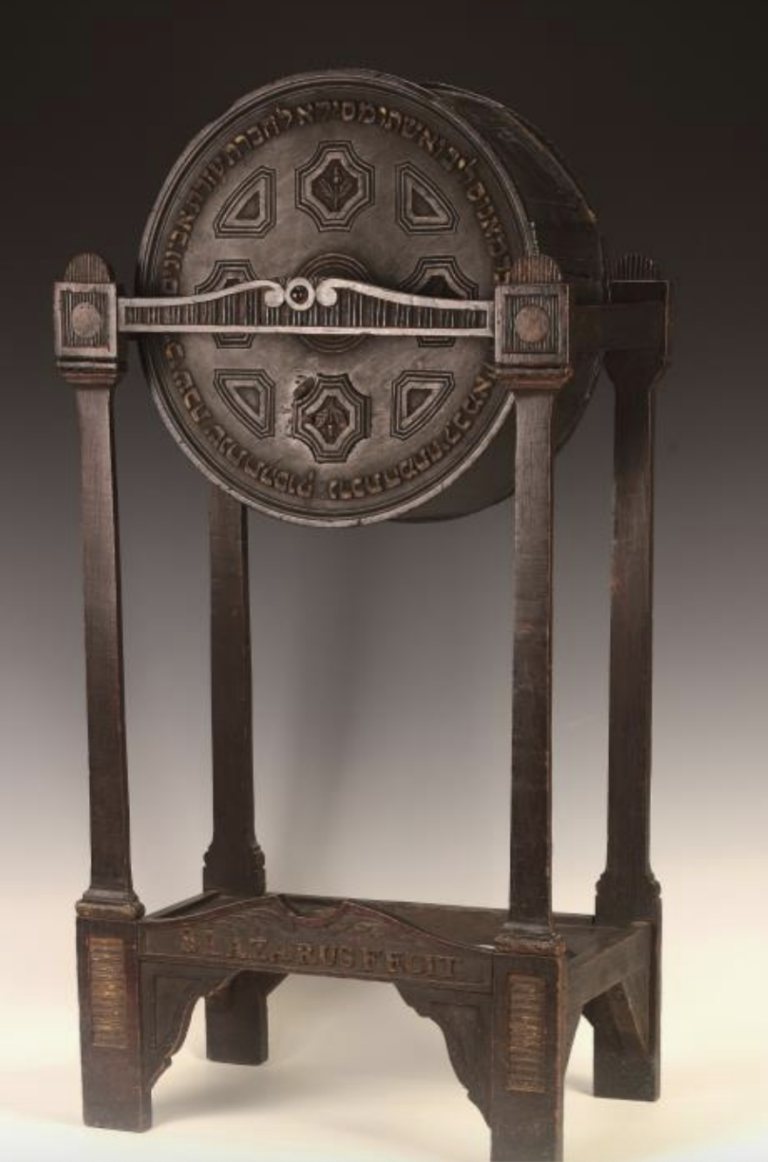
The exhibition also features, as the centrepiece of the exhibition, Rembrandt’s Judas Returning the Thirty Pieces of Silver that he painted in 1629 in his early 20s. The painting shows a rather sympathetic-looking Judas bringing the money he took back to the Priests after having severe remorse over betraying Jesus as a disciple, yet the Priests refuse him and push him away. Judas, therefore, is condemned to his fate.
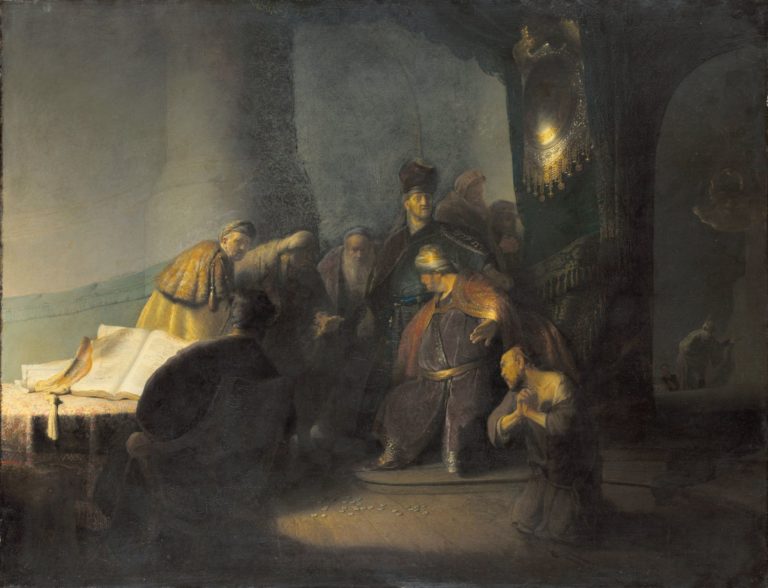
The selection of this painting sets the historical tone for the self-seeking greed Judas had which, by becoming very significant and widely embraced in Christian iconography, has helped anti-Jewish stereotypes snowball. The director of the museum explains this by saying: “Myths and stereotypes have origins, and this exhibition draws on objects from over 2000 years to go to the roots of Jewish practices around money.” She also says that “it shows how certain dangerous, even deadly, interpretations emerged and still proliferate around the world.”
The Jewish Moneylender
The exhibition moves forward towards the world of modern commerce and capitalism through the notion of the Jewish moneylender. While changing rooms, I am greeted by a bronze wallet and what seems to be an iPhone lying on a bench nearby. When looked closely, it appears to be a piece of artwork by Ryan Gander called Zooming Out made from the artist’s wallet and phone in a bronze cast, which (later I hear) has been reported to the reception by many people.
The artwork, in my opinion, is important to see what the visitor would do in such a situation, especially by contextually relating it to the contents of the exhibition.
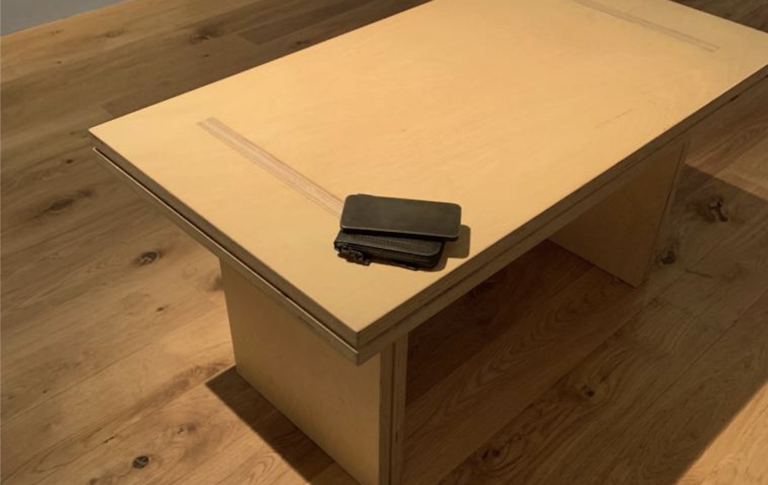
The concept of the moneylender in the medieval and early modern period was often depicted in a way that is reminiscent of Judas’s physical qualities regardless of the fact that it was not just Jews who worked as moneylenders. The exhibition features a children’s dice game from 1807, called The New and Fashionable Game of the Jew, which has a Jewish banker stereotypically sat in the middle overseeing while players try to collect the highest number of tokens by rolling a dice. By placing him in the middle, it is emphasized throughout the gameplay that the Jewish banker controls the money and constantly keeps an eye on it. Stephen Sondheim, the Jewish-American composer, owns a copy and describes it as the game that “taught kids to be antisemitic”.

The Myth of the Modern Capital
One of the world’s most successful Jewish families, the Rothschild family feature more than once throughout the exhibition, starting with a sculpture of Nathan Mayer Rothschild, who came to London from Germany in 1798 and started what is known today as the successful Rothschild empire. The sculpture below by Jean-Pierre Dantan depicts him in a grotesque, dehumanised manner with bulging eyes and rolls of fat, tightly holding his bags of money. This sculpture visualises the antisemitic views against the Jewish population working with money, painting them out to be selfish and monstrous money-obsessed creatures.
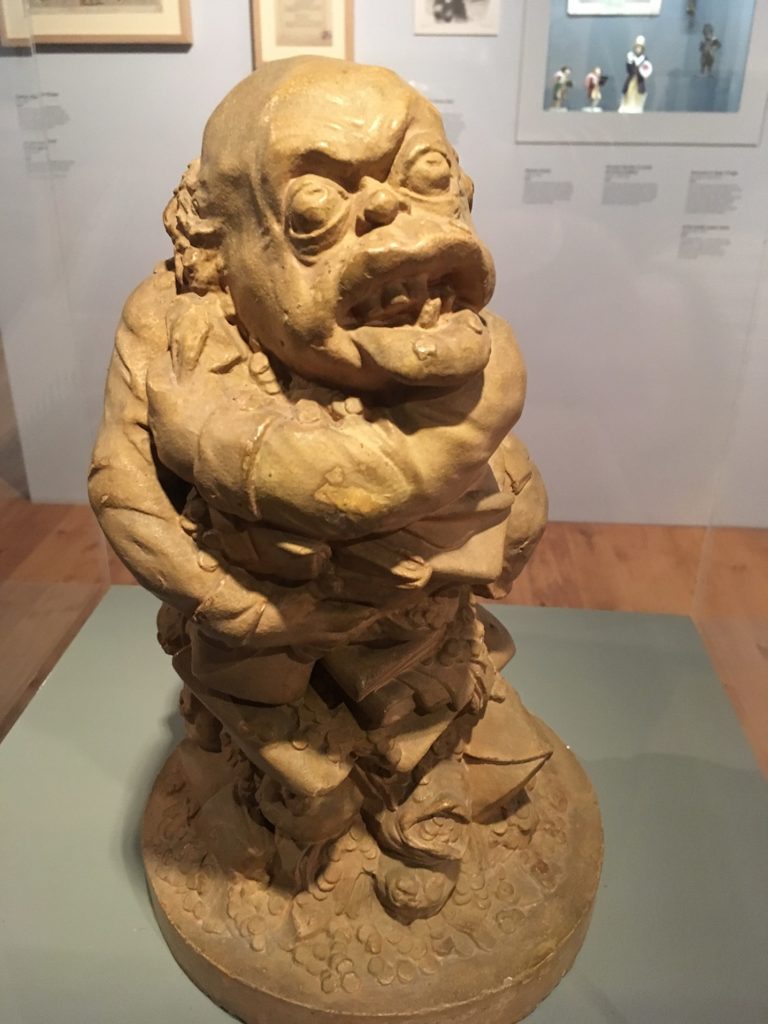
The Rothschild family’s success made them the topic of many conspiracy theories since Mayer Rothschild’s time. Doug Fishbone’s The Jewish Question depicts an offensive conspiracy theory that outrageously claims that the Rothschild family helped fund the holocaust and somehow engineered the second world war in order to gain global sympathy to justify the founding of the State of Israel.
As the first half of the 20th century brought along ideological conflict, Jews took the role of the ‘Bolshevik accomplice’ while also remaining the ‘disgustingly rich capitalists’, therefore becoming a scapegoat for both ideological sides to blame. The exhibition features Der Giftpilz (The Poisonous Mushroom), an excerpt from a children’s racist Nazi propaganda book.
The text reads, “Money is the god of the Jew. He commits the greatest crimes to earn money. He won’t rest until he can sit on a great sack of money, until he has become king of money. And with this money he would make us all into slaves and destroy us. With this money he seeks to dominate the whole world.”
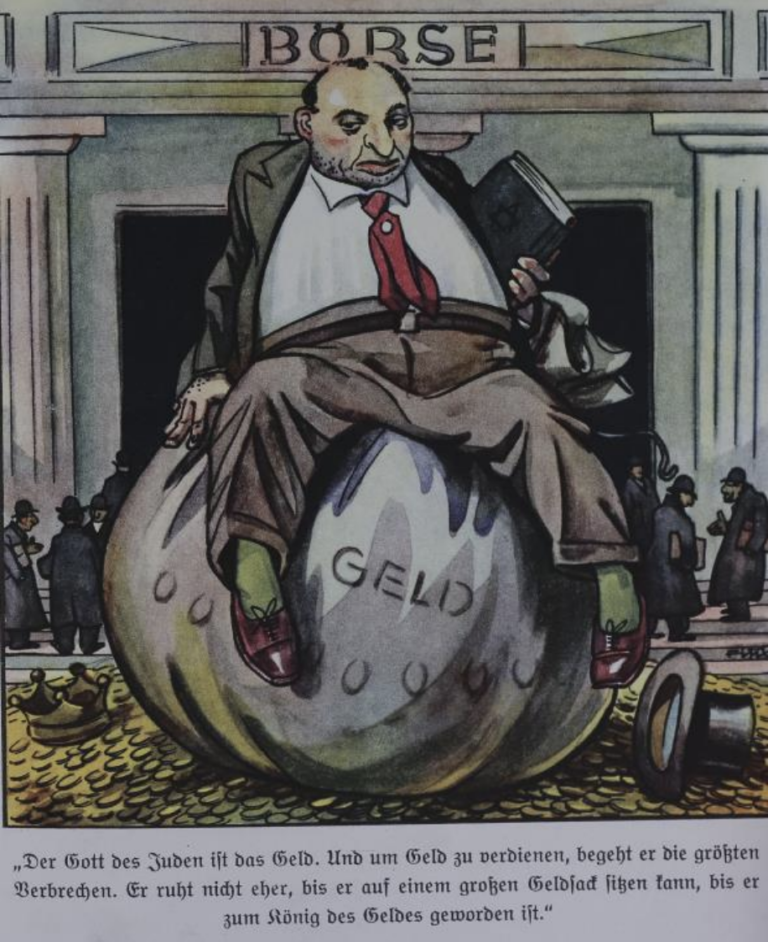
Many more controversial and racist WW2 posters are on display, ranging from Nazi-occupied Serbia to fascist Italy. The Italian antisemitic poster below portrays stereotypical Jewish men with bags of money in their hands walking away from a bloody warzone full of tanks and dead bodies. All these posters are claiming that Jews profit from wars economically and therefore instigate them to help the supposed ‘Jewish world domination plot’.

21st Century
The exhibition also features items and content from the 21st Century, ranging from newspaper excerpts on George Soros to a 17-minute long clip that shows instances where modern TV series and animations had antisemitic moments on the issue of money. This clip features many sequences from shows such as Family Guy and South Park, which demonstrates how the ‘money myth’ has become a joke in everday life, making it easier for it to become a stereotype.
The director of the museum says that “As a museum dedicated to the history and culture of Jews in Britain, we are more aware than ever of the importance of providing a safe space to consider and challenge such stereotypes, if we are to combat hatred and challenge ignorance.” Jews, Money, Myth aims to first explain the roots of the stereotype and then challenge it with facts supported by powerful art which leaves the visitor thinking about it for hours and days to come.
It is a must see for everyone looking to be stimulated intellectually and culturally.
The exhibition is on till the 17th of October 2019.
Editor’s Note: The opinions expressed here by Impakter.com columnists are their own, not those of Impakter.com – In the cover picture: Betrayal of Christ by Unknown Artist Credit: Jewish Museum London









